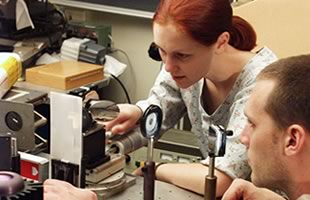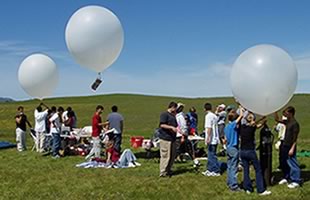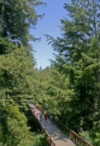Information for New and Prospective Undergraduates
The Department offers majors in Physics, Astrophysics, and Applied Physics. The Physics and Astrophysics majors are designed to prepare students for advanced graduate study in more specialized subjects. The Applied Physics major is good preparation not only for industrial careers but also graduate studies. 
Physicists study the laws that govern the composition and behavior of the Universe from subatomic particles all the way to superclusters of galaxies. The Physics department offers Bachelor of Science degrees in Physics, Physics (Astrophysics), and Applied Physics. Overall these majors are more similar: they all
require a complete, common set of introductory and advanced physics classes, and all three are good preparation for graduate work in any Physics department, for those who are interested in pursuing that path. The required curriculum for all three majors includes the study of "classical" physics topics like mechanics (the causes of motion and how to calculate it), electricity and magnetism, and thermodynamics, and "modern" topics like quantum mechanics, relativity, and statistical mechanics (the modern approach to thermodynamics). Laboratory courses teach the scientific method with both rigor and creativity, the use of common laboratory equipment, and data analysis. All students in all three majors complete a senior thesis in their final year under the supervision of a faculty member, an experience
which at many other universities is reserved only for honors students.
The Applied Physics major differs from the physics major only in requiring one quarter of chemistry, and in offering a much wider range of choices for upper-division elective courses, including many in engineering and other departments. This major is the ideal choice for any student who expects to enter industry upon graduation, or is considering adding a Master's degree in applied physics, engineering, or computer science to their career preparation. But since it still includes the full sequence of core physics courses, it has no disadvantage for students who want to leave the option open for graduate physics work. Traditional Applied Physics careers involve the use of physics expertise to develop new devices and technologies that are not accessible using current tools available to engineers. Examples include quantum computers, new kinds of solar cells and transistors, medical imaging techniques, advanced lasers, new materials, etc. But this degree is also useful for students who expect to switch entirely into the worlds of engineering, computer science, data analytics, or even finance, and want the broad and widely-respected training in general problem-solving that comes with a physics background.
The Physics (Astrophysics) major offers a choice of two specialized upper-division laboratory courses for astronomy and astrophysics in place of the laboratory course for Physics and Applied Physics majors.
Astrophysics upper-division electives are required for Physics (Astrophysics) majors but are also available to the other majors. UCSC's world-renowned Department of Astronomy and Astrophysics does not have an undergraduate program of its own, so majors in Physics (Astrophysics) often do research projects with its faculty as well as faculty in the Physics department. Astronomy and Physics faculty study planets around other stars (exoplanets), cosmology (the birth of the Universe, dark matter and dark energy, and the development of galaxies), black holes, and other astronomical topics. Our techniques span the range from instrument development to observations using ground and space observatories to analytical and computational theory. Unlike Astronomy degrees at other universities, the Physics (Astrophysics) degree is a complete Physics program, making it easier to choose any career or graduate path upon graduation.
The Department also offers a Physics minor comprised of the introductory sequence, modern physics, the intermediate lab, and an upper division elective. The Astrophysics minor is offered by the Department of Astronomy and Astrophysics.
If you are considering one of the majors offered by the physics department but have not yet made up your mind or declared, please get in touch with the undergraduate advisor, Christian Sanchez, and the coordinator of faculty advising, David Smith. We offer advising services to help prospective majors be prepared and make their decision, as well as advising students who have declared. Because our major programs are very structured, it is easier to transition from physics to another program than from another program to physics. If physics is one of your options, it's best to start as if you will end up in here, with Physics 5A at the start of your freshman year, if possible. If you are already further along and are considering switching to physics, contact us as soon as you can so we can arrange the best plan for you.
Trnasfer students generally enter the program with preparation such that they can complete a physics major in two quarter compressed years, or three years allowing more time for undergraduate research and independent study; you are encouraged to discuss the relative advantages and disadvantages of these two possibilities with your undergraduate advisor.
Check out the Physics Department Welcome Presenation here:
The following is a list of resources available for our new and continuing students:
Undergraduate Research
Involvement in original research as an undergraduate, usually as a research assistant working with a member of the faculty, is a “second education” that can be as valuable as the education received in classwork. These opportunities represent the biggest advantage of studying at a large research university.
Finding the right research opportunity requires forethought and persistence. Those who are planning to go to graduate school should start research well before the autumn of their senior year if possible, so that their research advisor knows them well and can write them a meaningful letter of recommendation. Start looking by the start of your junior year, or even earlier if your grades are good and if you have fulfilled the Department's programming requirement early. Contact faculty individually to make appointments to discuss possible research opportunities, and keep an eye on the student job listings as well. You can find the research interests of the faculty members by visiting their websites. You should also feel free to email faculty in other departments whose research interests you. For example, members of the Astronomy and Astrophysics faculty often work with astrophysics majors. If you are having trouble finding a research opportunity, a faculty committee can screen your information in order to suggest to you some particular professors to contact who might have opportunites for you. If you would like us to do this, please fill out the form Research Opportunity Facilitation Form.
All students in all three majors have the option of completing a senior thesis in their final year under the supervision of a faculty member, an experience which at many other universities is reserved only for honors students. In addition, summer research projects are available at universities and government laboratories throughout the country. A partial list of these opportunities, with links, is available here.
Undergraduate Advising
Physics undergraduate advising is administered by the Division of Physical and Biological Sciences office of Undergraduate Affairs. In addition, each declared or prospective physics major is assigned a faculty advisor whom they can email at any time to make an appointment . While a student is welcome to approach either advisor with any issue, the Undergraduate Affairs advisor specializes in course requirements and progress towards degree, including consultations with your college advisor, while the faculty advisors specialize in issues like research opportunities, careers, and graduate school. Your advisors are also an important resource for help in how to study effectively and succeed in your classes.
major is assigned a faculty advisor whom they can email at any time to make an appointment . While a student is welcome to approach either advisor with any issue, the Undergraduate Affairs advisor specializes in course requirements and progress towards degree, including consultations with your college advisor, while the faculty advisors specialize in issues like research opportunities, careers, and graduate school. Your advisors are also an important resource for help in how to study effectively and succeed in your classes. All three major programs offered by the physics department involve a carefully constructed 4-year sequence of courses that build on the foundation established in Physics 5A/B/C in the freshman year. Sample course planners and other information about major requirements are avaiable here
Contacts:
Undergraduate Affairs advisor: Christian Sanchez, physicsadvising@ucsc.edu
Coordinator of faculty advising: David Smith, dsmith8@ucsc.edu
Society of Physics Students
The Society of Physics Students (SPS) is a professional association explicitly designed for students. Membership is open to anyone interested in physics. The only requirement for membership is that you be interested in physics. The SPS exists to help students transform themselves into contributing members of the professional community. Course work develops only one range of skills. Other skills needed to flourish professionally include effective communication and personal interactions, leadership experience, establishing a personal network of contacts, presenting scholarly work in professional meetings and journals, and outreach services to the campus and local communities. Learn more about our local chapter of SPS at http://sps.ucsc.edu.
Weekly Colloquium
Thursday at 4:00 p.m. is colloquium time. Every week during the quarter a speaker talks on a subject of interest to upper-division physics majors, graduate students, and faculty. Speakers come from other universities, from research centers, and from industry. A few will be from UCSC. A wide variety of subjects related to physics are discussed. All students are encouraged to attend. Astrophysics majors may also be interested in the weekly colloquium of the Astronomy and Astrophysics department, at 3:45pm on Wednesdays. Being able to hear about cutting-edge research every week is one of the main advantages of being educated at a research university, so don't miss out. More specialized research seminars also take place in the department every week. These are usually more advanced and specialized than colloquia, but may still sometimes be of interest to you. While the department webpages list some information on colloquia and seminars (links), the best source of detailed information is to look at the flyers posted each week.
Considering STUDY ABROAD?
Due to the highly structured nature of the course sequence in physics, it can be particularly difficult to take a quarter abroad without disrupting a four-year graduation plan. Physics students who want to take a quarter abroad should begin planning very early and look into several possible schools. Problems sometimes arise with availability or level of appropriate courses. It is the responsibility of students considering education abroad to find out the details of course content and level at the institution they will be attending, and to confirm with the physics department that course credits will transfer. This is often most readily accomplished by finding out which text is being used and which sections are covered. For more information, visit https://studyabroad.ucsc.edu/.
